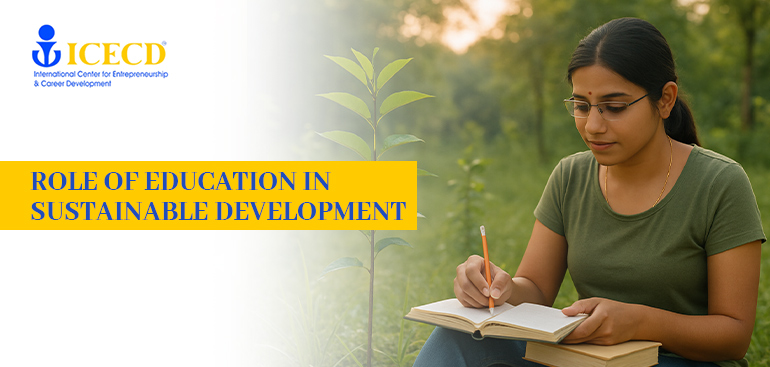In today’s rapidly changing world, sustainable development is no longer a choice – it’s a necessity. At the heart of creating a sustainable future lies education. Education not only enlightens individuals about pressing environmental, economic, and social issues but also equips them with the skills to drive meaningful change. In India, organizations like the International Centre for Entrepreneurship and Career Development (ICECD) are playing a crucial role in integrating sustainability into education, empowering communities to build resilient and thriving futures.
What is Sustainable Development?
Sustainable development refers to the idea of meeting the needs of the present without compromising the ability of future generations to meet their own needs. It is a balanced approach that combines economic growth, environmental care, and social inclusion. Education is vital in helping people understand these interconnected pillars and inspiring them to take action.
Why is Education Important for Sustainable Development?
Education for sustainable development means giving people the knowledge, skills, and values they need to build a more balanced, environmentally friendly, and sustainable future. Education helps individuals and communities realize the significance of preserving natural resources, promoting equity, and supporting economic growth that benefits all.
Moreover, the United Nations identifies education as a primary driver for all 17 Sustainable Development Goals (SDGs), which include eliminating poverty, ensuring clean energy, promoting gender equality, and addressing climate change amongst others.
How Does Education Contribute to Sustainable Development?
Education contributes to sustainable development by creating awareness, building critical thinking skills, and encouraging innovation. It fosters a sense of responsibility among citizens to protect the environment, advocate for social justice, and pursue economic opportunities in a sustainable manner. Through inclusive education, marginalized communities gain tools to overcome poverty and contribute positively to society.
For example, ICECD’s programs focus on empowering women and rural youth with skills in entrepreneurship, sustainable farming, and eco-friendly practices – directly linking education to livelihood and environmental stewardship.
Key Roles of Education for Sustainable Development
1. Raising Environmental Awareness
One of the critical aspects of education is making people aware of environmental issues such as pollution, climate change, and biodiversity loss. By understanding the impact of their actions, individuals are better equipped to adopt greener lifestyles and support policies that protect natural resources.
2. Promoting Sustainable Economic Growth
Education encourages innovation and sustainable entrepreneurship. Training programs that focus on eco-friendly business models, renewable energy, and sustainable agriculture open up new economic opportunities, especially in rural areas. This leads to both community upliftment and environmental conservation.
3. Strengthening Social Equity
Education promotes inclusivity and equal opportunity. By providing access to quality education for marginalized groups – particularly women, tribal communities, and economically disadvantaged sections – a more just and equitable society can be built.
4. Preparing Future Leaders
A sustainability-oriented education system nurtures leaders who are mindful of global challenges and are capable of crafting solutions that balance development with environmental care.
How Can Education for Sustainable Development Be Integrated into Communities?
Integrating sustainable development education into communities involves making it accessible, practical, and relevant. Workshops, local training programs, and community-led initiatives are effective ways to spread sustainable practices. Using real-life examples, hands-on training, and incorporating indigenous knowledge make the education relatable and impactful. Institutions like ICECD are pioneers in designing community-based education models that blend traditional skills with modern sustainability techniques.
For instance, ICECD’s village-level programs teach women how to start eco-friendly businesses, promote solar energy, and adopt water conservation methods — showing that sustainable development begins at the grassroots.
Examples of Education Impacting Sustainable Development in India
Several successful initiatives show how education drives sustainable development:
- Skill-Based Programs by ICECD: Training rural women in eco-friendly entrepreneurship, which leads to economic independence and community development.
- Swachh Bharat Abhiyan Awareness Campaigns: Educating citizens about hygiene and sanitation has improved public health and reduced pollution.
- Solar Energy Training Workshops: Youth across India have been trained to install and maintain solar panels, creating jobs and promoting clean energy.
These examples underline how education tailored to local needs can significantly accelerate sustainable development.
What are the Challenges in Promoting Education for Sustainable Development?
Despite progress, several challenges remain:
- Lack of Access: Remote and economically disadvantaged areas often lack quality educational resources.
- Curriculum Gaps: Traditional education systems do not always include sustainability concepts.
- Awareness Deficit: There is still a lack of awareness about the importance of sustainability among many communities.
Overcoming these challenges requires collaboration between governments, Institutions like ICECD, educators, and local communities.
Future of Sustainable Development Education in India
The future of sustainable development education in India is promising. National policies like the National Education Policy 2020 emphasize the importance of environmental education and vocational skills. Organizations like ICECD will continue to play a vital role in designing innovative programs that integrate sustainability into entrepreneurship, skill development, and career planning. As India marches towards its 2030 Sustainable Development Goals, strengthening education systems with a sustainability focus is key to achieving lasting change.
Conclusion
Education is more than just a tool – it is the foundation upon which sustainable societies are built. It shapes attitudes, cultivates skills, and empowers communities to create a balanced future where economic growth, environmental care, and social equity go hand in hand. Through innovative education initiatives, organizations like ICECD are lighting the path towards a greener, more equitable India.
Also read:



